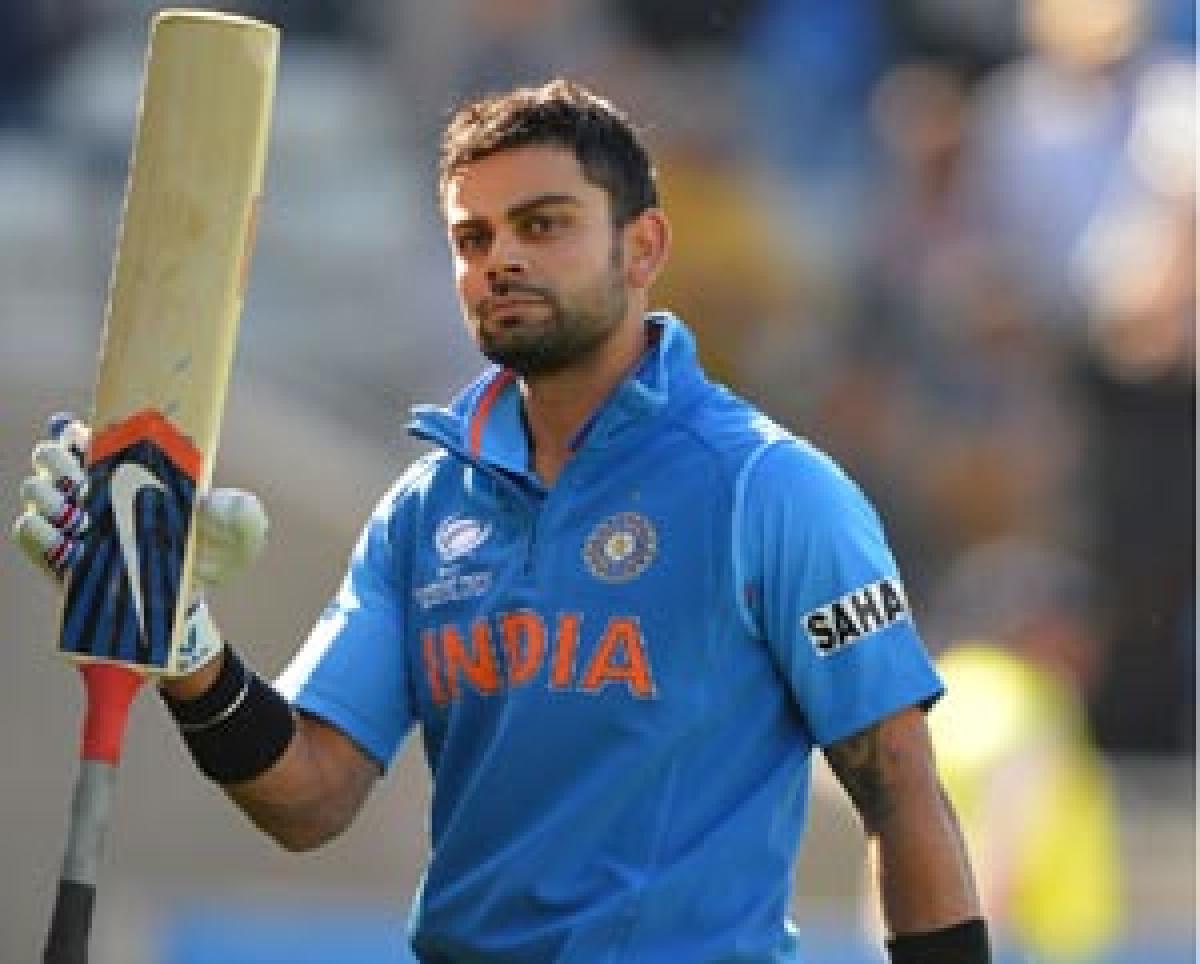Live
- GMR Airports Unveils AI-Powered Digital Twin Platform to Transform Airport Operations
- India poised to become leading maritime player: PM Modi
- Top Causes of Kidney Stones and How to Recognize Silent Symptoms
- India’s renewable energy capacity logs 14.2 pc growth at 213.7 GW
- Winter Session of Odisha Assembly adjourned sine die
- Biden calls Trump's tariff approach 'major mistake'
- After Drama Over Eknath Shinde’s Chief Minister Race, Maharashtra Cabinet Formation Faces New Tensions
- Egyptian FM, Blinken discuss recent developments in Syria
- Iran's supreme leader says Syria's developments result of US-Israeli 'plot'
- Elon Musk to Purchase $100 Million Luxury Mansion Next to Donald Trump's Mar-a-Lago, Report Reveals
Just In

Whether India will be the first country to win the World Twenty20 a second time or not, there is hope so long as Virat Kohli wields the willow on the pitch, as he has done in the tournament, winning key matches on his own.
Whether India will be the first country to win the World Twenty20 a second time or not, there is hope so long as Virat Kohli wields the willow on the pitch, as he has done in the tournament, winning key matches on his own. In the 2016 edition, he batted superbly to set a decent target to beat Pakistan and on Sunday night he made a taut target against Australia look like a stroll in the park.
Who says Twenty20 is all inventive hitting, far removed from conventional strokeplay. It’s balderdash. You can possess more than one stroke to a particular delivery to confuse the fielding captain and the bowler, but that’s sheer art exhibited by a Viv Richards, a Brian Lara or a V.V.S. Laxman, though he had few chances to play Twenty20.
These greats could hit a delivery pitching at the same spot anywhere from cover point to fine-leg in conventional, pure art form. They could bludgeon any attack just as Chris Gayle, AB de Villiers, Kevin Pietersen or Glenn Maxwell do in such a thrilling fashion in shorter formats with sheer power and scrumptious timing.
Kohli took batsmanship to a different level in this tournament, more so stroking the ball in the 18th and the 19th over against Australia at Mohali. A knock even he may not, perhaps, be able to repeat. What makes it so special is that he produced his magic in a do-or-die match of a major international tournament. The strokes and the boundaries flowed from his bat when 39 runs were needed from the last three overs and that, too, as the Australians appeared to have covered all the bases in the field.
Kohli’s majestic strokeplay will forever be etched in the memories of all those who saw the match live at the Inderjit Singh Bindra Punjab Cricket Association Stadium at Mohali and others who bit their nails nervously watching the drama unfold on the telly. Many jogged their memory to recapture the two thunderous knocks of Sachin Tendulkar at Sharjah, also to beat the Australians, albeit in 50-over matches, 18 years ago to compare with Kohli’s knock.
Mind you, this was not blind or cross-batted hitting, all classical strokes that would have been graciously applauded in a Test match. Right through the Indian innings, it appeared there were more than eleven men in the field as every stroke seemed to find a fielder. On this big ground, only the batsmen with strong legs could convert ones into twos, not a Yuvraj Singh helplessly hobbling with a twisted ankle. He was the first to realise it by throwing his wicket away.
Suddenly, Kohli started finding the ropes with unerring regularity with no fielder anywhere near. It was said he hit through the gaps, though the areas were heavily policed. Yet, he found huge gaps to shoot through seven fours and a six from the barrel of his machine gun in those two frenetic overs and the match was over as he left the winning stroke for his skipper Mahendra Singh Dhoni.
The only explanation for finding the gaps could be that the fielders were stricken by a fear psychosis seeing Kohli at his smashing best and that left them immobilised. They could not stop Kohli and Dhoni from converting one into twos. And what understanding and running between the wickets by the two! India had a tough time right through the tournament and Kohli was the man to give the side some runs to bowl against Pakistan and against Bangladesh, and Dhoni did the same with smaller yet vital contributions.
Invariably, comparisons have begun and the players from each era had their favourites. The only batsman Kohli, in such imperious form, could be compared with is Viv Richards in whose time there was no Twenty20. Both played their strokes with beautiful hands, wrists being key in guiding the ball wherever they pleased to place it. The big difference is that Richards could hit with savage power, too.
Dhoni did not forget to ask his team-mates after the Australia match that how long would they depend on one man to carry the side with his bat. The skipper rightly wants the top order and the middle-order to take some responsibility and provide relief for Kohli so that he could bat a lot freely to make things easier for the team in the semis and the final. What should not escape the mind is that both Dhoni and Kohli are on the same page, each acknowledging the other’s role in shouldering the team. There is a nice feeling about it and this spirit should motivate their other "class" team-mates to carry India to the summit.

© 2024 Hyderabad Media House Limited/The Hans India. All rights reserved. Powered by hocalwire.com







